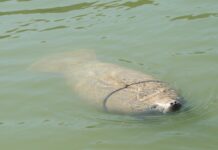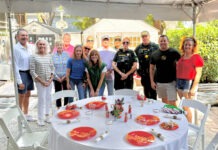
What will become of the building that was Jimmy Buffett’s recording studio at Key West’s Historic Seaport (also known as the Key West Bight)? A decision could be made on Dec. 10, when the board that oversees the city-owned property at the bight considers proposals from two entities that want to lease the building.
The Key West Bight Board was slated to choose one of those proposals at its Nov. 12 meeting. But an orchestrated, online pressure campaign urging the board to select one proposal over the other may have backfired.
Long known as Shrimp Boat Sound, the boxy little windowless building that’s covered with stickers sits along Key West’s Harbor Walk, between Schooner Wharf Bar and the Conch Republic Seafood Co.
That building, which Buffett’s company had leased from the city and used as a recording studio, is now empty and in need of repairs. In the wake of Buffett’s September 2023 death, his estate canceled its lease this past June and emptied the building of all recording equipment.
One building, two visions
The bight board members, each of whom is appointed by a city commissioner, along with city staff, now must decide what to do with the building, which has become an unofficial memorial site for Buffett.
Key West owns all the buildings and property surrounding the seaport and leases them to restaurants, bars, boats and watersports businesses, providing significant revenue to the city. The bight board approves proposals for those leases and oversees the bight’s management.
The city had received two proposals for that building via two different methods, each one completely legal, despite suggestions of impropriety or favoritism by an online blog entry posted three days before the board meeting.
In the days leading up to the November meeting, following the post on Substack, bight board members each received 1,200 to 1,500 identical, copy-and-pasted, aggressive emails criticizing the proposal submitted by Robert Spottswood, Jr. and Spottswood Management Co. The emails urged the board to support a proposal submitted by Nevada businessman David Bernsen, who also owns properties in Key West and said he was once a majority owner of the former Smokin’ Tuna Saloon in Key West.
The online opinion piece that led to the email campaign called the $25,000 check that was attached to the Spottswood proposal, “tribute money to the gods of City Hall.”
The $25,000 check was a proposal review fee that’s required by city law.
And the resulting email campaign instead angered at least three members of the bight board.
Here are details of the proposals.
SPOTTSWOOD PROPOSAL
On Sept. 17, Robert Spottswood Jr., whose family has included prominent Key West developers, attorneys, business owners, politicians and philanthropists for eight generations, submitted an unsolicited proposal for a public-private partnership, or P3.
Such a project typically involves transferring a significant portion of the project’s risk to the private contractor with the goal being a long-term benefit for both entities.
“It is our intention to operate this space as a frozen drink and margarita bar, museum and retail sales operation showing the city of Key West’s music, arts and fishing history, with limited indoor seating and outdoor seating for up to 20 persons,” Spottswood’s 35-page proposal states.
The city would receive rent that would include a percentage of revenue from the proposed new business. The proposal was hand-delivered to the city manager’s office on Sept. 17. The city code requires that the entity submitting an “unsolicited detailed P3 proposal,” pay an up-front $25,000 project review fee. “Payment must be made by cash, cashier’s check, or other noncancelable instrument. The city will not review an unsolicited detailed proposal that is not accompanied by the payment of this fee,” city code states.
Spottswood’s proposal included that $25,000 check. It was a proposal review fee, not ”tribute money to the gods of City Hall,” as the online post stated.
City law also states, “Within 30 business days after receipt of the unsolicited detailed proposal and proposal review fee, the city, through the city manager or designee, will either summarily reject the unsolicited detailed proposal and return the proposal review fee or accept the unsolicited detailed proposal for substantive review.”
Spottswood did not hear from any city staff member within the 30-day timeframe, but was not given back the $25,000 fee. The code further outlines a 90-day timeframe, stating, “Within 90 business days after receipt of the unsolicited detailed proposal, the city will notify the private entity in writing of the city’s decision either to reject the unsolicited detailed proposal, proceed with the unsolicited detailed proposal for competitive review or proceed with the unsolicited detailed proposal, unless this timeframe is extended ….”
The 90-day timeline from the date of receipt would give the city until Dec. 17 to respond to the Spottswood proposal.
BERNSEN PROPOSAL
On Oct. 16, Nevada businessman and Key West property owner David Bernsen submitted a letter of interest for the building. His 3-page proposal was submitted in response to a public notice the city had run in a local newspaper seeking “letters of interest” from entities with proposals for that property.
In his proposal, Bernsen wrote that he had been in contact with musicians Mac McAnally, Kenny Chesney and Zac Brown, along with Buffett’s daughter, Savannah, and sister, LuLu.
“We would propose to lease the property from the city of Key West, with our goal of restoring it to a working recording studio buoyed by recording artists, including those mentioned above,” states Bernsen’s proposal. “Our primary objective goes beyond just a recording studio as we are looking to create a profitable tourist destination, so when not in use as working studio, our uses would include tours, experiential recording opportunities, memorabilia, art, live events, etc. — with 100% of profit generated going directly to Key West local charities and community support.
“Furthermore, not only is it our intention to create a profit-driven business that directs all profits for the betterment of Key West, but also provide a destination for millions of “Parrot Heads” to visit and celebrate the life and music of Jimmy Buffett.
“We understand the city of Key West must generate revenue from the Key West Bight location, so we are prepared to pay the market lease price,” his proposal states.
BIGHT BOARD
Both proposals were attached to the Nov. 12 bight board meeting agenda, which included a summary from city staff, who were recommending the bight board pursue negotiations with Bernsen.
The board ultimately voted to postpone until Dec. 10 its decision on the former recording studio, as questions remained unanswered for some members.
Several members of the public supported Bernsen’s proposal without disparaging the other. They discussed their affinity for or association with Buffett and his music and urged the board to preserve the building as a recording studio while generating charitable donations via Bernsen’s proposal.
Key West business owner Joe Walsh suggested to the board that a decision would be premature, as, he noted, the city had not followed its own process for a P3 proposal.
Board member Bill Lay agreed, after confirming that no one from the city had contacted Robert Spottswood Jr. about his unsolicited P3 proposal within 30 days of its submission.
“I’ve not had any communication with the city or the bight board since our proposal was submitted on Sept. 17. I thought I’d have a chance to address the board today,’ Spottswood said during the meeting. “Our family employs nearly 500 people and I believe we’ve done a lot of good for the city of Key West. But when I see the online comments, many from people who don’t even live here, it’s not fair. Our city is being run by an outside group that sends a lot of emails, but most of the information in them is not accurate. I would have loved to have had this discussion earlier and I don’t think this process has gone the right way.”
Board member Lay derided the mass email campaign that had filled his and the other board members’ inboxes with 1,400 identical messages, questioning the Spottswood family’s profit-driven motives and suggesting a potential boycott of the proposed bar.
The original online post that prompted the email uproar called the Spottswood proposal “a cocktail of arrogance, influence and procedural perfume.” The emails called Bernsen “the barefoot idealist with the real estate portfolio, trailed by troubadours and true believers. … Their offer reads like a psalm to lost Key West.”
Lay started the board’s discussion by saying, “Let me be clear. The Spottswood family has done more for Key West than most and have been of great service to this city. So to make them the big bad wolf here, and to diminish someone’s name is inappropriate and unfair. I don’t know where or how this started, but it’s pretty obvious it was going after the Spottswoods. Please, let’s go back to some civility.”
Board chair Michael Knowles echoed Lay’s disgust, calling the email campaign a “cult mentality trying to degrade people that’s shameful. It’s sad that this is what Key West is coming to, that this is how we’re behaving as adults, following some sort of leader, copying and pasting emails.”
Spottswood attended the Nov. 12 meeting in person, and Bernsen participated via Zoom. Bernsen said he had nothing to do with the email campaign, other than to have read the original blog post.
Ultimately, Lay asked Spottswood and Bernsen whether the two of them could sit down and perhaps draft a proposal together.
“I’d love it, I’d welcome it,” Bernsen said. “I need local people to help me do this.”
Spottswood also agreed, adding,. “The city needs revenue and I believe there’s a way to do it by integrating Jimmy Buffett.” He also acknowledged that use of Buffett’s name, image and other elements is a legal matter that would require approval from his estate and attorneys.
The bight board eventually voted unanimously to postpone a decision until the Dec. 10 meeting, although board members Arnaud Girard and Heather Slivko-Bathurst expressed hesitation. Slivko-Bathurst asked, “I’m a little confused why we’re trying to bring these two businesses together. Why are we trying to make room for both?”
Lay said it was because “Mr. Spottswood has had zero conversations with the city and we’re obligated to do that.”
Slivko-Bathurst replied, “So my suggestion would be that the city have that conversation with him.”
But ultimately, all members agreed to postpone the decision until Dec. 10. So for now, the future of the former recording studio — as a source of margaritas or music — remains undecided.The video of the meeting, along with the agenda and links to the proposals is available at cityofkeywest-fl.gov.













